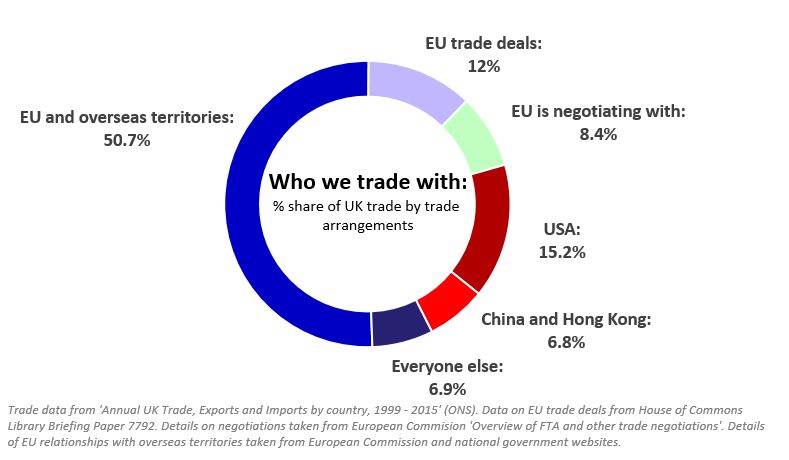David Hannay is a member of the House of Lords and former UK ambassador to the EU and UN.
As Liam Fox continues to clock up air miles at our expense with nothing to show for it beyond a few warm words, mostly from the least trustworthy and most erratic US president in living memory, it is time to scrutinise the trade policy aspirations he has for Britain outside the EU. The House of Commons International Trade Committee has the perfect opportunity to grill our trade secretary when he appears before it tomorrow.
The case for arguing that the UK would be better off negotiating trade agreements on its own rather than relying on the clout of the world’s biggest single market was always flawed. Brexiters support the case by saying that Britain trades more with non-EU countries than it does with other EU members. Well, yes, only 49% of our trade is with the EU. But trade with overseas EU territories is another 2% while 12% is with countries that the EU has trade deals with. All in all, our EU membership is responsible for 63% or nearly two-thirds of our trade.

Look then at some of the main targets for new bilateral trade agreements the government has identified. Fox has spent a lot of time in the Gulf pursuing an agreement with the Gulf Cooperation Council (GCC). But the GCC is now involved in an existential internal crisis, with three of its members (Saudi Arabia, Bahreïn and the UAE) at daggers drawn with a fourth (Qatar). The GCC is in no condition to negotiate a trade agreement with anyone.
Then there is the US, which indeed is a substantial trading partner. But can anyone watching the Trump administration casually dismantling the Trans Pacific Partnership and the North Atlantic Free Trade Area and proposing to slap huge duties on Bombardier aircraft whose wings are made in Belfast believe that the US is in the mood to cut us a favourable deal? Far more likely they will take advantage of the needy way the government has approached them to drive a hard and disadvantageous bargain.
Some of the other main target countries (Japan, Mercosur, Australia, New Zealand) are either at an advanced stage of negotiating free trade agreements with the EU or giving that much larger market priority over ours, particularly when our government remains unable even to say what sort of trade relationship it would like with the EU after Brexit. And some targets (India, Brazil, Argentina) are only too likely to seek concessions on our immigration policy when the government finally gets round to setting out what that should be.
It would be better if Fox stopped chasing those overstated will o’ the wisps and concentrated on the humdrum task of ensuring that we continue to enjoy a free trade relationship after Brexit with the 66 non-EU countries with whom we currently have free trade as a result of our EU membership. But of the 17 foreign trips he has made since he became trade secretary, only three are to these countries, according to Open Britain. Fox has got his priorities wrong.
Edited by Hugo Dixon


Leave a Reply